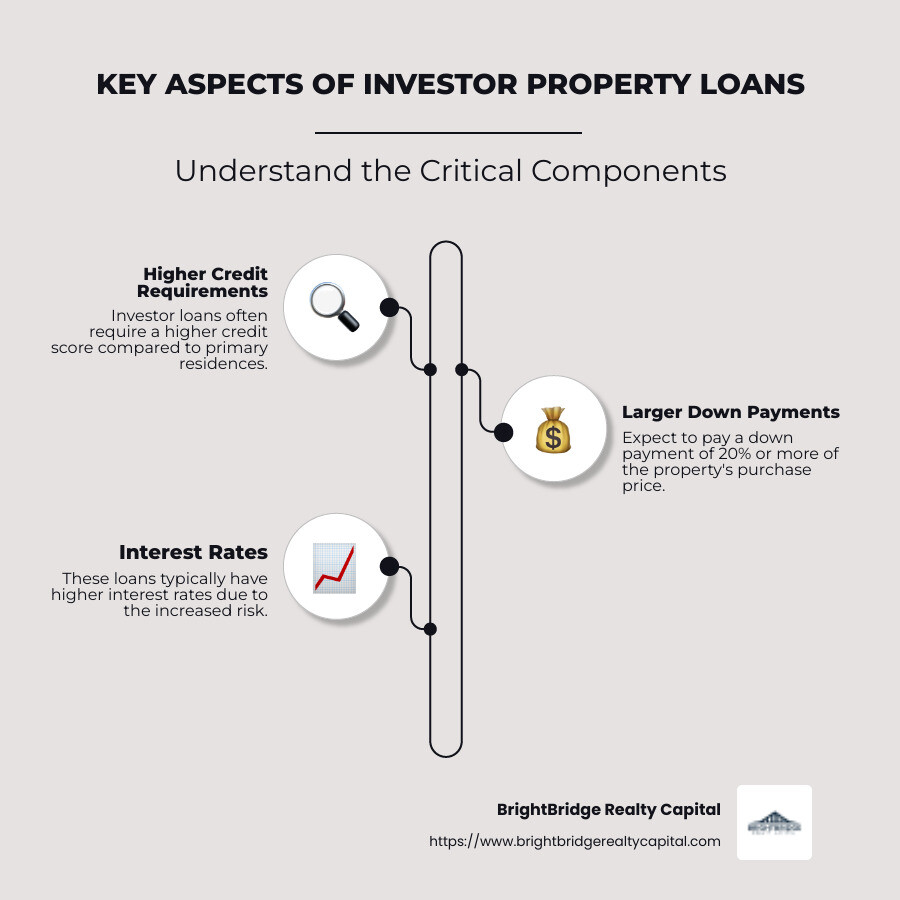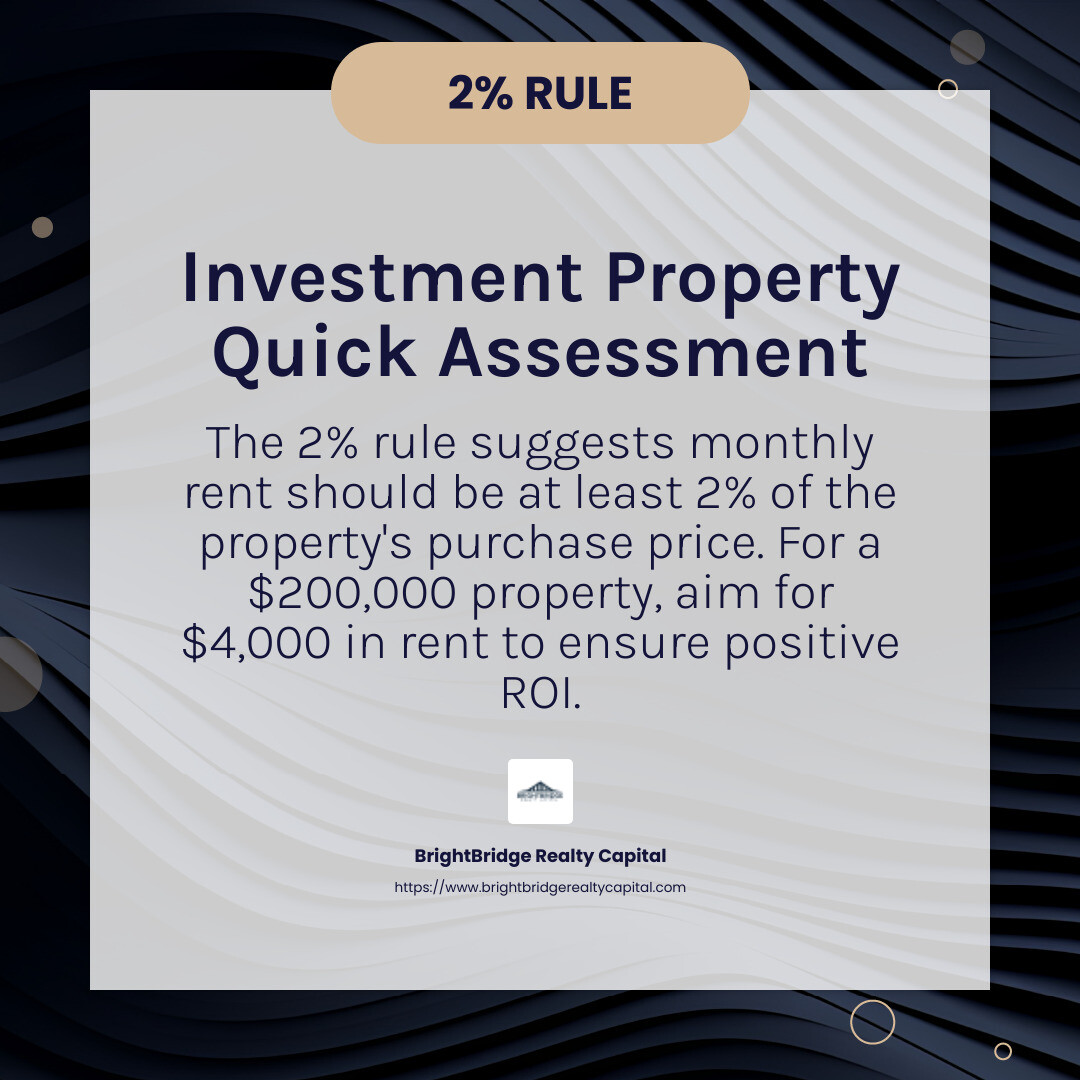Investor Property Loans: Your Path to Real Estate Success

For budding and experienced real estate investors alike, navigating the landscape of investor property loans is crucial for securing and expanding income-generating properties. Whether you're purchasing your first rental unit or flipping multiple properties, understanding the financing options available is key to your success.
Here's a quick overview of what you need to know about investor property loans:
- Higher Credit Requirements: Expect more stringent credit score demands than those for primary residences.
- Larger Down Payments: Typically 20% or more of the purchase price.
- Interest Rates: Usually higher than traditional home loans due to greater risk.
- Loan Types:
- Conventional Loans: Standard choice with no occupancy requirements.
- Government-Backed Loans: FHA and VA options if you meet specific criteria.
- Alternative Financing: Includes hard money, private, and owner financing.
Real estate offers an exciting opportunity for portfolio growth through steady cash flow and asset appreciation. Still, choosing the right loan can feel like a complex puzzle.

Simple guide to investor property loans terms:
Understanding Investor Property Loans
Investor property loans are designed to help you purchase properties that will generate income. These loans are different from the ones you get for your primary home. They're crucial for anyone looking to earn rental income or profits from real estate investments.
What Are Investment Property Loans?
An investment property loan is a type of financing specifically for buying properties that will produce income. These properties can be anything from single-family homes to multi-unit buildings. The main goal is to generate steady cash flow through rent or resale.
Why Choose Income-Producing Properties?
Income-producing properties are a popular choice for investors because they provide a regular revenue stream. This could come from tenants paying rent each month or from business operations in commercial spaces.
How Rental Income Works
Rental income is the money you earn from tenants who live in or use your property. It's a key factor in determining whether your investment is successful. Here's how it works:
- Collecting Rent: You charge tenants a monthly fee to live in your property.
- Covering Costs: Use rental income to pay for mortgage, maintenance, and other expenses.
- Earning Profit: Ideally, the rent you collect exceeds your costs, providing you with profit.
The Benefits of Rental Income
- Steady Cash Flow: Monthly rent can provide a reliable income stream.
- Increased Property Value: Over time, property values may rise, boosting your investment.
- Tax Advantages: Expenses related to your rental property, like repairs and mortgage interest, may be tax-deductible.
Choosing the right investor property loan is essential to maximize these benefits. With the right financing, you can secure properties that not only pay for themselves but also contribute to your financial growth.
As you consider your options, each loan type has its own set of requirements and benefits. Whether you're looking at conventional loans or exploring alternative funding, understanding your choices will help you make informed decisions.
Types of Investor Property Loans
When diving into real estate investments, understanding the different types of investor property loans is crucial. Each loan type comes with its own perks and challenges, and choosing the right one can make a big difference in your investment journey.
Home Equity Loans and HELOCs
Home Equity Loans and Home Equity Lines of Credit (HELOCs) allow you to borrow against the equity in your current home.
- Home Equity Loan: Offers a lump sum with a fixed interest rate. It's great for investors who need a specific amount for a down payment or renovation.
- HELOC: Functions like a credit card. You can borrow, repay, and borrow again during the draw period. It has variable rates and is flexible for ongoing expenses.
Cash-Out Refinance
A Cash-Out Refinance lets you replace your existing mortgage with a new one for more than you owe, giving you the difference in cash. This option can offer lower interest rates and a single monthly payment, making it a popular choice for accessing home equity.
Conventional Loans
Conventional Loans are the go-to for many investors. They typically require at least a 620 credit score and a 15% down payment for rental properties. These loans are available for both single-family and multifamily properties.
Government-Backed Loans
FHA and VA Loans provide options for those who might not qualify for conventional loans. FHA loans require a minimum 580 credit score and 3.5% down, while VA loans offer 0% down for eligible veterans, though they are limited to primary residences.
Hard Money Loans
Hard Money Loans are short-term loans based on the value of the property rather than your credit. They have higher interest rates and fees but can be a quick option for those looking to flip properties or bridge financing gaps.
Private Loans
Private Loans come from individuals or private companies. They offer flexibility but can strain personal relationships if not managed carefully. These loans often have fewer borrower protections.
Portfolio Loans
Portfolio Loans are kept by lenders instead of being sold on the secondary market. This means lenders might offer more flexible terms, especially to their long-term clients.
Commercial Loans
Commercial Loans are for properties with five or more units or other business-related real estate. These loans require more documentation and have stricter qualification requirements.
DSCR Loans
Debt Service Coverage Ratio (DSCR) Loans are based on the income your property generates. Lenders want to ensure your rental income covers your expenses and loan payments. It's a good option if you have a strong rental income stream.
Bridge Loans
Bridge Loans offer temporary financing while securing more permanent funding. They are useful for quick purchases but come with higher interest rates and shorter terms.
SBA Loans
SBA Loans are for business-related property investments. These loans are backed by the Small Business Administration and can be used for purchasing or expanding business properties.
Choosing the right investor property loan depends on your financial situation and investment goals. Each option has unique requirements and benefits, so understanding these can lead to smarter investment decisions.
How to Qualify for an Investor Property Loan
Qualifying for an investor property loan can be a bit more challenging than securing a mortgage for your primary residence. Lenders often view investment properties as higher risk, so they have stricter requirements. Here’s what you need to know to improve your chances of qualifying.
Credit Score
Your credit score is a key factor in qualifying for a loan. For conventional loans, you'll generally need a minimum credit score of 620. However, if you can't make a down payment of at least 25%, you'll need a credit score of 700 or higher. A higher credit score not only increases your chances of approval but can also help you secure a better interest rate.

Down Payment
Investment properties usually require a larger down payment compared to primary residences. While you might find some options with a 15% down payment, most lenders expect at least 20%. Putting more money down can demonstrate to lenders that you’re serious about the investment and reduce their risk, which may result in lower interest rates.
Cash Reserves
Lenders want assurance that you can cover mortgage payments even if rental income fluctuates. That's why having cash reserves is critical. Typically, you’ll need to show that you have enough funds to cover six to twelve months of mortgage payments. These reserves provide a safety net and reassure lenders of your financial stability.
Loan Requirements
Each loan type has specific requirements. For example, conventional loans often require a 45% debt-to-income (DTI) ratio, meaning your total monthly debt payments should not exceed 45% of your gross monthly income. Additionally, lenders will review your income, often allowing you to include actual or estimated rental income from the property to help you qualify.
It's important to gather all necessary documentation, such as tax returns, W-2s, bank statements, and pay stubs, to streamline the application process. Being prepared can make a significant difference in how smoothly your application proceeds.
Qualifying for an investor property loan involves meeting several financial criteria, but with careful planning and preparation, you can improve your chances of securing the financing you need for your real estate investment.
Next up, we'll explore strategies for successful real estate investment, including tips on maximizing rental income and boosting your return on investment (ROI).
Strategies for Successful Real Estate Investment
When it comes to real estate investment, having the right strategies can make all the difference. Let's explore some key approaches that can help you succeed in investor property loans.
Rental Properties: Building Steady Income
Owning rental properties is one of the most popular ways to generate passive income. The idea is simple: purchase a property, find reliable tenants, and collect rent. But there’s more to it than meets the eye.
Location is crucial. Choose areas with low property taxes, good schools, and amenities like parks and shops. A neighborhood with a growing job market is a bonus, as it attracts more renters.
Maintenance matters. Regular upkeep of your property not only keeps tenants happy but also preserves the value of your investment. Set aside about 1% of your property's value each year for repairs.
Know the laws. Understanding landlord-tenant laws in your area is essential. Familiarize yourself with security deposits, lease requirements, and eviction rules to avoid legal headaches.
Flipping Homes: The Art of Quick Profits
Flipping homes involves buying properties, renovating them, and selling for a profit. It’s a more hands-on approach but can be lucrative if done right.
Find the right property. Look for homes in up-and-coming neighborhoods or those in need of cosmetic updates. Avoid properties with major structural issues unless you have the expertise and budget to handle them.
Budget wisely. Calculate all costs, including purchase price, renovation expenses, and holding costs like utilities and taxes. This ensures you’re prepared and can avoid surprises.
Sell smart. Timing is everything. Sell during peak market seasons when buyers are more active. Pricing competitively and staging your home can also help attract potential buyers quickly.
Maximizing Passive Income and ROI
Whether you're renting or flipping, maximizing your return on investment (ROI) is the ultimate goal.
Understand the 2% rule. This rule suggests that your monthly rent should be at least 2% of the purchase price. It's a quick way to gauge whether a property will generate positive cash flow.
Leverage tax benefits. Real estate investors can benefit from tax deductions like mortgage interest, property taxes, and depreciation. These can significantly improve your ROI.
Keep an eye on the market. Stay informed about market trends and adjust your strategy accordingly. Whether it’s increasing rent or choosing the right time to sell, being proactive can boost your investment returns.
Investing in real estate offers numerous opportunities for growth and income. By employing the right strategies, you can steer the complexities of investor property loans and turn your investment into a success story.
Up next, we'll tackle some frequently asked questions about investor property loans, providing you with the answers you need to make informed decisions.
Frequently Asked Questions about Investor Property Loans
Is it difficult to get an investment property loan?
Getting an investment property loan can be more challenging than securing a loan for a primary residence. Lenders often require a higher credit score—typically at least 620—for these types of loans. Additionally, you'll need to have a substantial down payment, usually around 20% or more. This is because investment properties are seen as riskier than owner-occupied homes.
Moreover, lenders want to see that you have cash reserves to cover several months of mortgage payments, even without rental income. This means having enough savings to handle unexpected vacancies or repairs.
What is the 2% rule for investment property?
The 2% rule is a guideline used by real estate investors to quickly assess if a property will be a good investment. According to this rule, the monthly rent should be at least 2% of the purchase price of the property. For instance, if you buy a property for $200,000, you should aim to charge at least $4,000 in monthly rent.
This rule helps ensure that the rental income will cover the mortgage and other expenses, providing a positive return on investment (ROI). However, it's important to note that the 2% rule is just a starting point. You should also consider other factors such as property taxes, maintenance costs, and market conditions.

Can I put down less than 20% on an investment property?
While a 20% down payment is standard for investment properties, there are situations where you can put down less. Some lenders offer options with as little as 15% down for a single-unit investment property. However, this often requires a higher credit score, typically around 680, and may come with higher interest rates.
There are also government-backed loans that might allow for lower down payments if you use one of the units as your primary residence. For example, FHA loans can require as little as 3.5% down, but these are more common for owner-occupied multi-unit properties.
The down payment will depend on the loan type, your credit score, and the lender's requirements. It's essential to explore all loan options and find one that suits your financial situation and investment goals.
By understanding these key aspects of investor property loans, you can better steer the complexities of real estate financing and make informed decisions. Up next, we'll explore how BrightBridge Realty Capital can help you achieve real estate success with customized financing solutions.
Conclusion
At BrightBridge Realty Capital, we understand that every real estate investor's needs are unique. That's why we offer customized financing solutions custom to help you achieve your investment goals. Whether you're looking to expand your rental portfolio or start on a new flipping project, our team is here to support you with the right financial tools.
One of our standout features is our ability to offer fast closings. We know that time is of the essence in real estate investing, and our streamlined process often enables you to secure funding within just one week. This means you can seize opportunities quickly and keep your projects on track.
Our competitive rates are another reason why investors choose us. By cutting out intermediaries, we provide direct lending solutions that are both cost-effective and efficient. This allows you to maximize your return on investment and focus on growing your real estate portfolio.
For those seeking a reliable partner in real estate financing, BrightBridge Realty Capital is your path to success. We invite you to explore our services and find how we can help you steer the complexities of investor property loans with ease and confidence.


